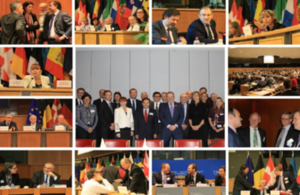A New Model for Deep Government & Business Engagement
The EU Green Growth Platform has a valid low carbon jobs, growth and competitiveness message to promote.

A New Model for Deep Government & Business Engagement
By Sandrine Dixson-Declève, Director, The Prince of Wales’s Corporate Leaders Group (CLG) & Executive Director, EU Green Growth Platform
We are in a critical phase in the development of a long-term policy framework for the low carbon transformation of the EU. The European Commission brought forward proposals for an EU 2030 Energy and Climate Change framework in January 2014. After months of discussions, Heads of State and Government reached a final decision in the October 2014 Council meeting. The European Union’s agreed 2030 climate goals (at least 40% domestic greenhouse gas emission target, 27% renewable energy target and 27% energy efficiency target) will now need to be implemented into policy. The agreed targets will also form the basis of the EU’s opening position at crucial global climate deal talks in the run up to the UNFCCC COP meeting in November 2015 in Paris.
While the diplomatic and climate change challenges are increasingly well understood, the economic challenges and opportunities of an ambitious European decarbonisation agenda are much more contested and complex. With this in mind, a group of like-minded EU Energy, Climate and Environment Ministers formed an informal grouping – the Ministerial Green Growth Group (BE, DK, ES, FI, FR, DL, IT, IR, NL, PT, SL, SW, ES, UK) – with a view to exploring, promoting and pursuing the economic and strategic opportunities that EU low carbon ambition can offer Europe. In particular, the Ministerial Green Growth Group wanted to reach out to a wider business, investor, economist and political audience to raise the level of debate in order to deepen our collective understanding of the potential economic and strategic benefits of the EU’s low carbon transition, how best to exploit these opportunities and how we can effectively manage the challenges.
One of the biggest challenges to an ambitious 2030 package is the sometimes inaccurate and incomplete picture that is becoming mainstreamed in the public and political narrative, linking energy and climate policies to rising energy prices and concerns over EU competitiveness. This ignores much of the wider context, including rises in wholesale oil and gas prices and Europe’s growing fossil fuel import dependency, the benefits to EU competitiveness and energy security that EU climate and energy policies can deliver, and the tools at our disposal to improve the cost- effectiveness of future EU energy and climate policies (internal energy market, innovation, early investment certainty etc). The purpose of the Business Green Growth Group is to provide an informed business and expert-led contribution to the debate along with some useful insights into the real challenges and solutions to the implementation of a low carbon and resource efficient economy. Such a vision also entails the key role of all manufacturing sectors, the internal energy market and infrastructure, innovation and sector-specific solutions for those sectors that are genuinely at risk of carbon leakage.
By gathering together key experts, business leaders and decision makers including Ministers, and Members of the European Parliament we believe that the Green Growth Platform plays an important role in informing the debate and bringing forward key solutions to possible challenges the low carbon transformation may bring. So far this model of engagement has worked as we have begun to demonstrate that the Green Growth Platform has a valid low carbon jobs, growth and competitiveness message to promote.
This has helped to build momentum for political discussions during the critical Council discussions on the 2030 climate and energy package. We have already contributed several discussion papers on the creation of a low carbon energy union and the benefits of green growth and have hosted key roundtable discussions and EU Summits. For the last 10 years the Cambridge Institute for Sustainability Leadership (CLG), through the Prince of Wales’s Corporate Leaders Group (CLG) and its business leaders has focused on the business and economic opportunities from de carbonisation whilst addressing the key challenges confronted by high carbon industries and countries. Through our work in Europe and further abroad in Brazil, Chile, Hong Kong, Japan, Korea, Turkey, USA with our Corporate Leaders Network partners, we have promoted the importance of deep exchange between government and business leaders as a way to unlock public-private partnership and climate policy ambition.
The green growth platform, which we are privileged to run, is a perfect model for deep exchange and we believe one which can both enhance exchange between business and policy leaders within a region as well as between different regions and countries. We welcome the possibility of similar platforms developing in the Latin American region and very much look forward to broadening the dialogue and enhancing climate action. As we move towards Paris and adopt what we hope will be a robust international climate deal, isn’t it time that we worked together in a more thoughtful manner to expedite action and decision making to achieve our common goal of an equitable, low climate risk, and resilient global economy.